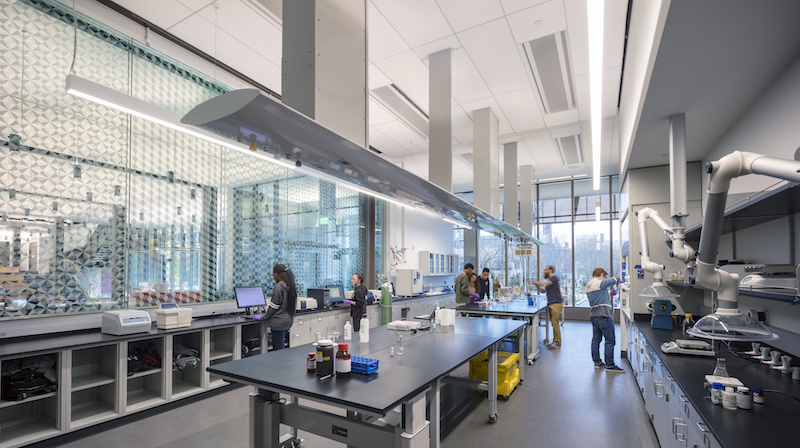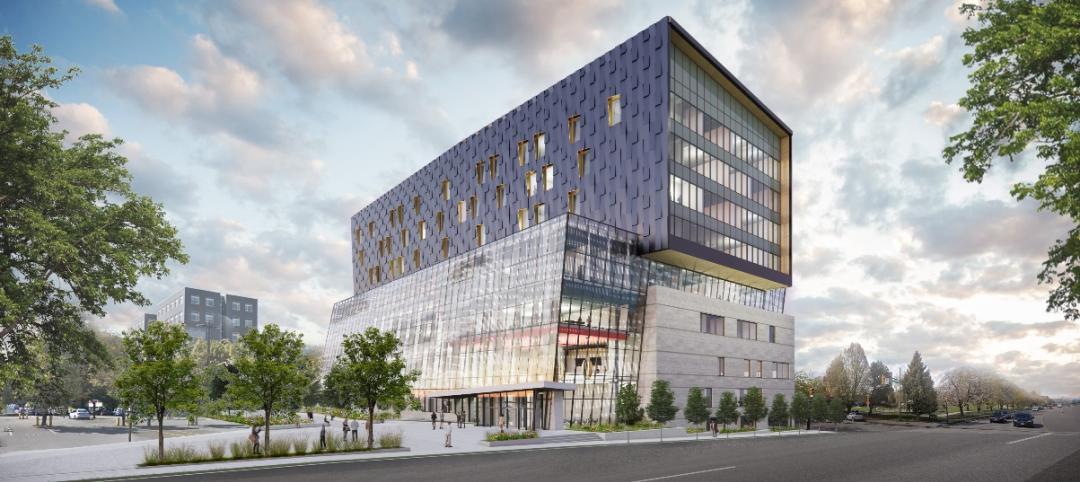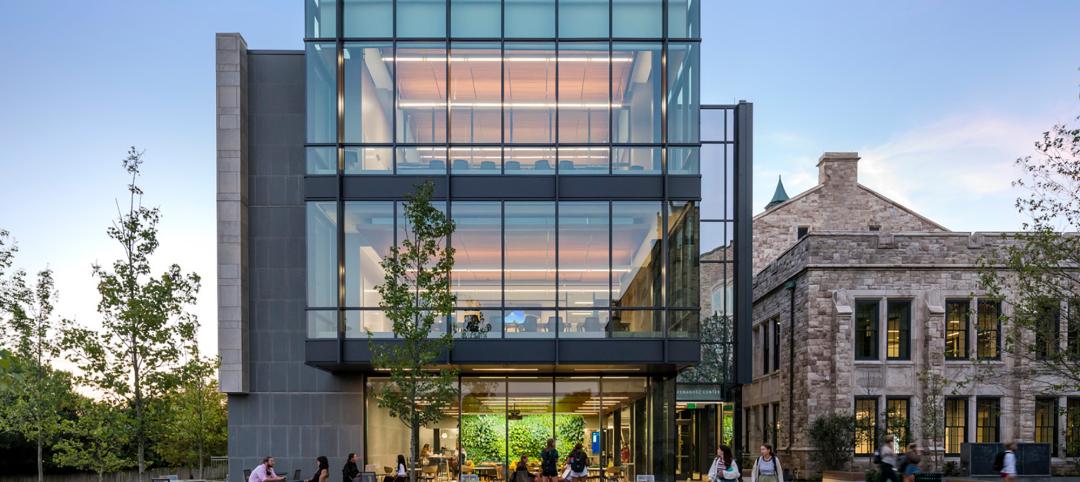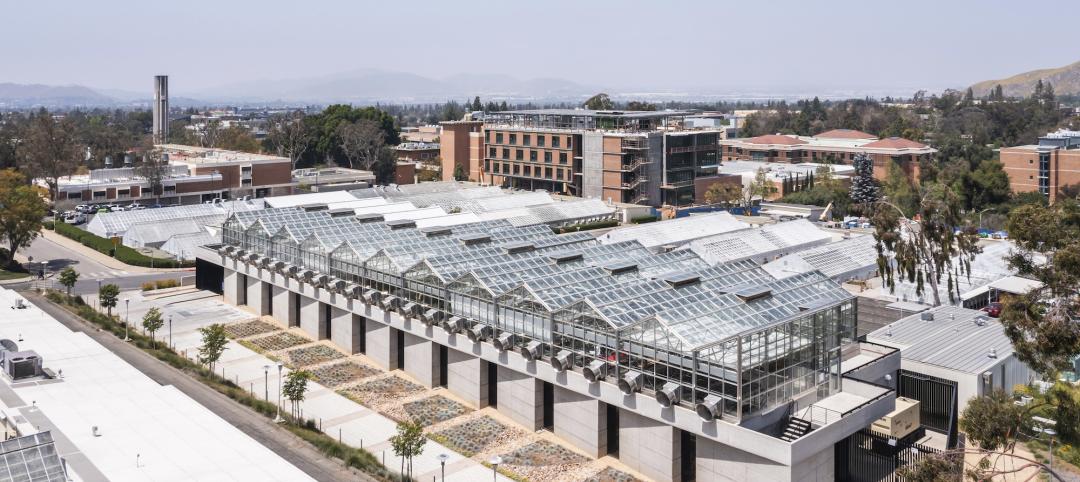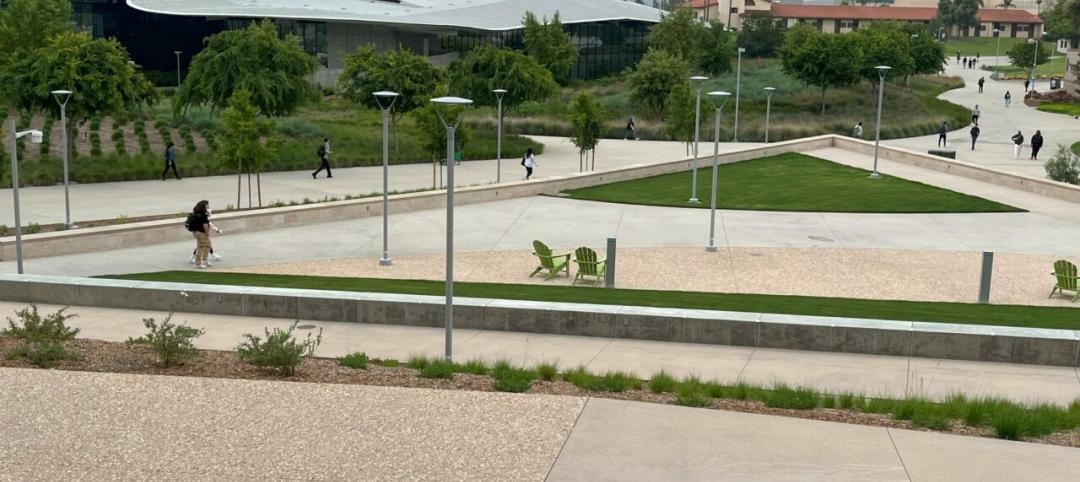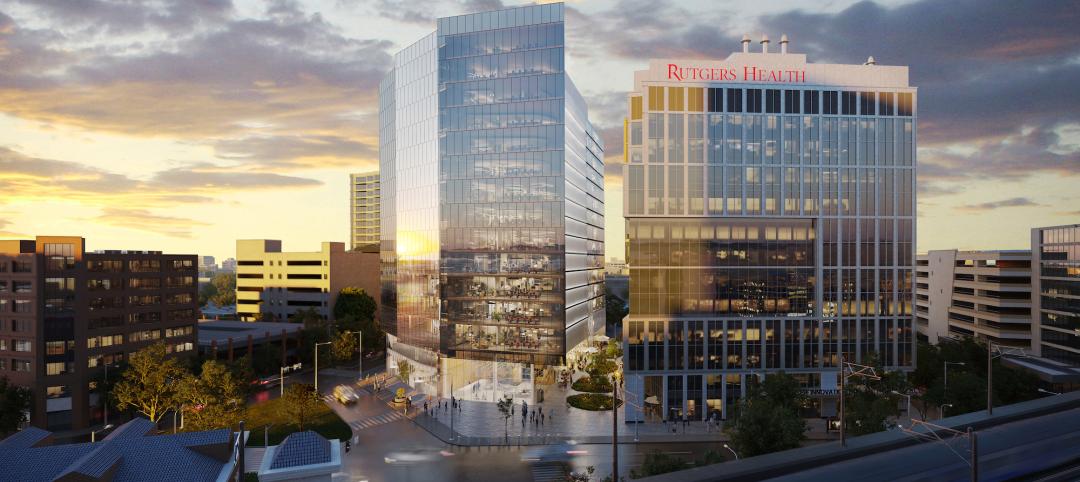The recently completed Engineering Research Center (ERC) at Brown University provides the school with 80,000 sf of space across three-floors. The building houses specialized research facilities for nanomaterials, photonics, and environmental science to help expand research in renewable energy and advanced materials.
Among the new $88-million facility’s spaces are an 8,000-sf cleanroom for nanomaterials, microelectronics, and photonics, an imaging suite, a bioimaging suite, 22 open-plan research labs, 116 dedicated workstations for graduate students, 20 lab modules, 10 conference/meeting spaces, and a café.
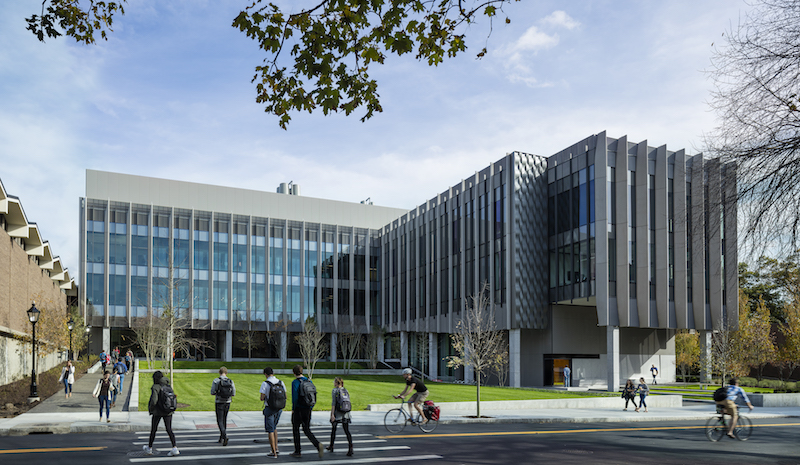 Photo: Warren Jagger Photography.
Photo: Warren Jagger Photography.
Also included are the Hazeltine Commons on the building’s first floor and Giancarlo Plaza, a green space outside the building’s front doors. These two spaces are designed to create an “intellectual community” for faculty and students from across the campus.
The ERC is is tracking LEED Gold Certification with an energy and performance goal of 25% better than minimum efficiency and performance criteria established in the Rhode Island-adopted International Energy Conservation Code. Among the building’s sustainable features are 60 glass reinforced concrete vertical fins to manage solar gain, four water-filling stations, and a façade made from 40% glass to capture natural daylight and lower energy costs.
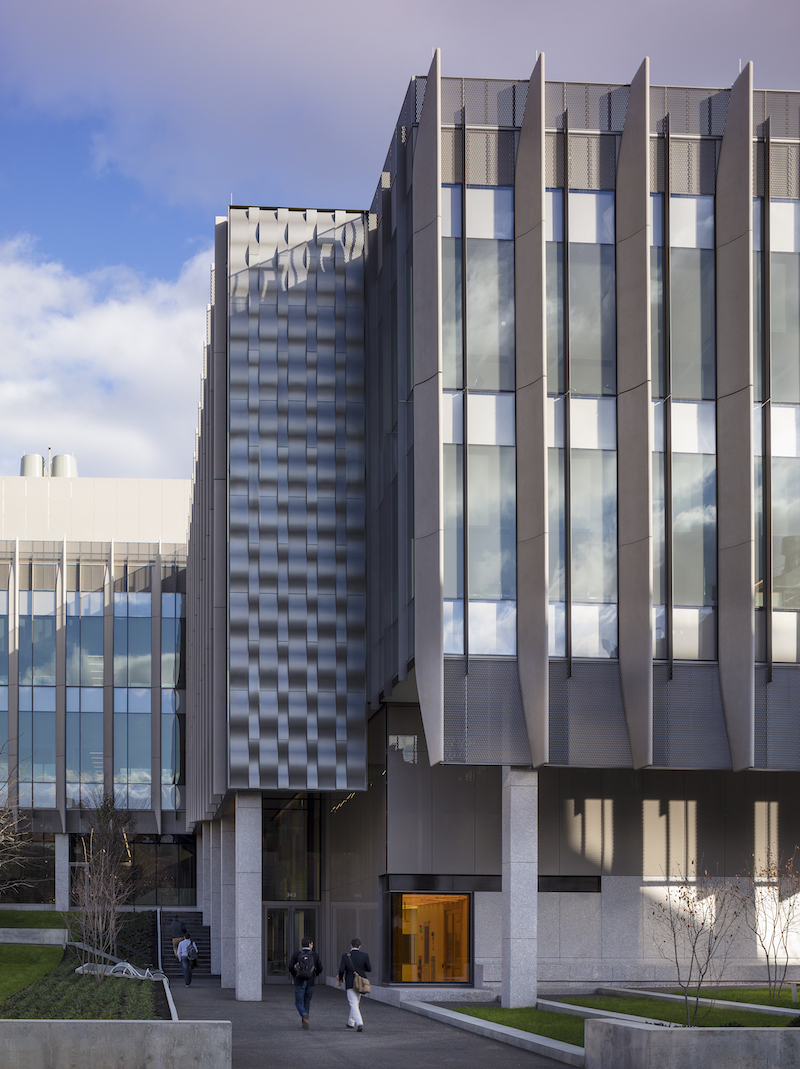 Photo: Warren Jagger Photography.
Photo: Warren Jagger Photography.
Shawmut Design and Construction used Integrated Project Delivery and Lean Construction delivery methods to finish the building months ahead of schedule. This is the first time a Brown University building was completed using these methods.
See Also: Virginia Commonwealth has at least three major expansion projects under construction
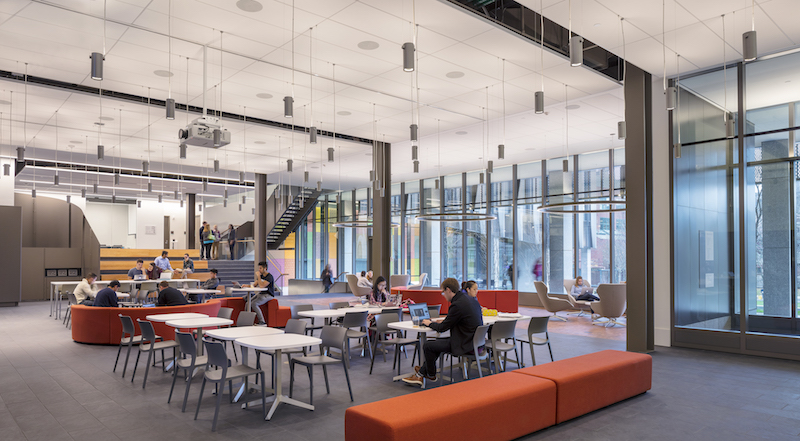 Photo: Warren Jagger Photography.
Photo: Warren Jagger Photography.
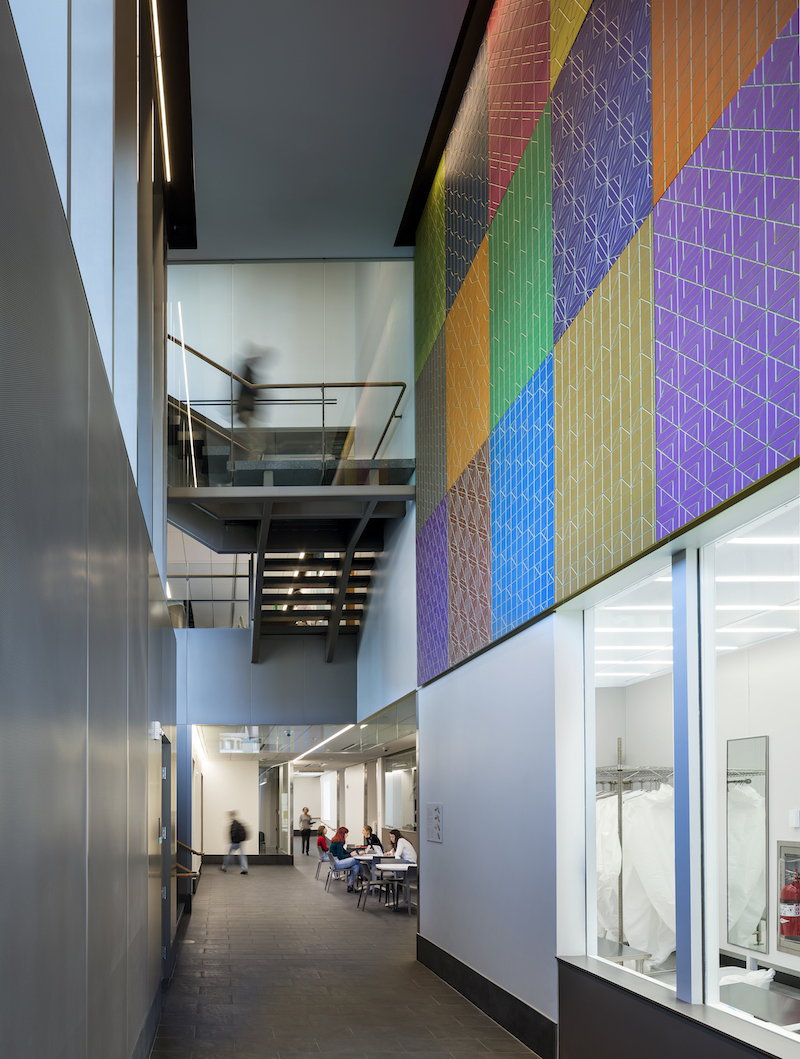 Photo: Warren Jagger Photography.
Photo: Warren Jagger Photography.
Related Stories
University Buildings | Aug 7, 2023
Eight-story Vancouver Community College building dedicated to clean energy, electric vehicle education
The Centre for Clean Energy and Automotive Innovation, to be designed by Stantec, will house classrooms, labs, a library and learning center, an Indigenous gathering space, administrative offices, and multiple collaborative learning spaces.
Market Data | Aug 1, 2023
Nonresidential construction spending increases slightly in June
National nonresidential construction spending increased 0.1% in June, according to an Associated Builders and Contractors analysis of data published today by the U.S. Census Bureau. Spending is up 18% over the past 12 months. On a seasonally adjusted annualized basis, nonresidential spending totaled $1.07 trillion in June.
Market Data | Jul 24, 2023
Leading economists call for 2% increase in building construction spending in 2024
Following a 19.7% surge in spending for commercial, institutional, and industrial buildings in 2023, leading construction industry economists expect spending growth to come back to earth in 2024, according to the July 2023 AIA Consensus Construction Forecast Panel.
Mass Timber | Jul 11, 2023
5 solutions to acoustic issues in mass timber buildings
For all its advantages, mass timber also has a less-heralded quality: its acoustic challenges. Exposed wood ceilings and floors have led to issues with excessive noise. Mass timber experts offer practical solutions to the top five acoustic issues in mass timber buildings.
Adaptive Reuse | Jul 6, 2023
The responsibility of adapting historic university buildings
Shepley Bulfinch's David Whitehill, AIA, believes the adaptive reuse of historic university buildings is not a matter of sentimentality but of practicality, progress, and preservation.
University Buildings | Jun 26, 2023
Univ. of Calif. Riverside’s plant research facility enables year-round plant growth
The University of California, Riverside’s new plant research facility, a state-of-the-art greenhouse with best-in-class research and climate control technologies, recently held its grand opening. Construction of the two-story, 30,000 sf facility was completed in 2021. It then went through two years of preparation and testing.
University Buildings | Jun 26, 2023
Addition by subtraction: The value of open space on higher education campuses
Creating a meaningful academic and student life experience on university and college campuses does not always mean adding a new building. A new or resurrected campus quad, recreational fields, gardens, and other greenspaces can tie a campus together, writes Sean Rosebrugh, AIA, LEED AP, HMC Architects' Higher Education Practice Leader.
Standards | Jun 26, 2023
New Wi-Fi standard boosts indoor navigation, tracking accuracy in buildings
The recently released Wi-Fi standard, IEEE 802.11az enables more refined and accurate indoor location capabilities. As technology manufacturers incorporate the new standard in various devices, it will enable buildings, including malls, arenas, and stadiums, to provide new wayfinding and tracking features.
Laboratories | Jun 23, 2023
A New Jersey development represents the state’s largest-ever investment in life sciences and medical education
In New Brunswick, N.J., a life sciences development that’s now underway aims to bring together academics and researchers to work, learn, and experiment under one roof. HELIX Health + Life Science Exchange is an innovation district under development on a four-acre downtown site. At $731 million, HELIX, which will be built in three phases, represents New Jersey’s largest-ever investment in life sciences and medical education, according to a press statement.
Engineers | Jun 14, 2023
The high cost of low maintenance
Walter P Moore’s Javier Balma, PhD, PE, SE, and Webb Wright, PE, identify the primary causes of engineering failures, define proactive versus reactive maintenance, recognize the reasons for deferred maintenance, and identify the financial and safety risks related to deferred maintenance.


